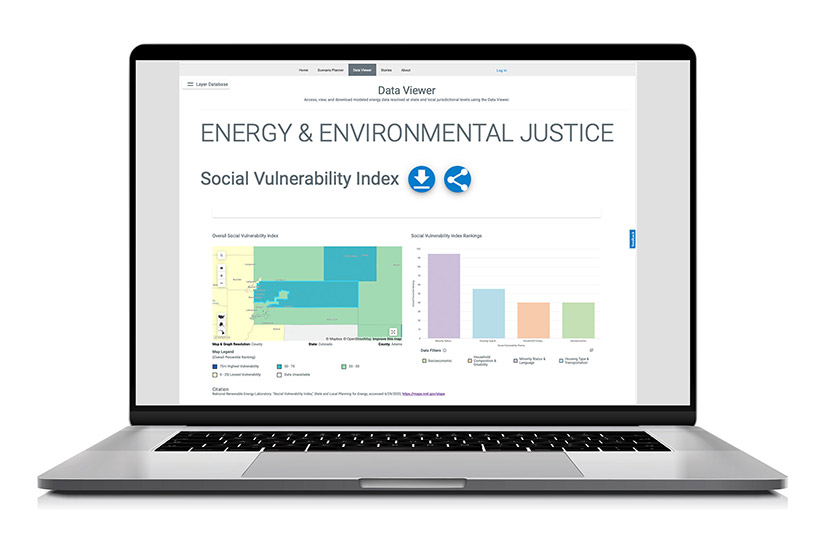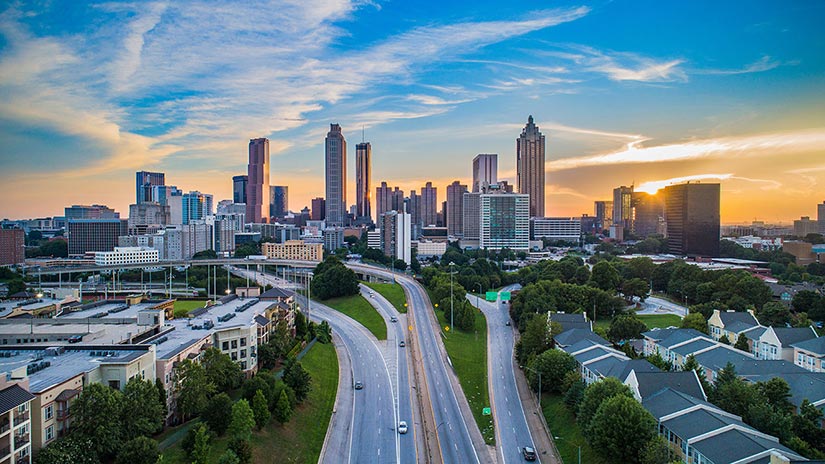SLOPE Platform Guides Equitable Clean Energy Planning
Atlanta Area Using SLOPE To Plan For Electric Vehicle Adoption So All Will Benefit
In 2020, more than a quarter of all U.S. households reported keeping their homes at an unsafe temperature due to energy cost concerns or having difficulty paying energy bills, according to a U.S. Energy Information Administration report.
The National Renewable Energy Laboratory's (NREL's) vision is a clean energy future for the world, focusing on developing solutions that enable all people to participate in and benefit from the transition to sustainable energy. The State and Local Planning for Energy (SLOPE) Platform is one such solution, helping local decision-makers determine the best energy solutions for a more equitable, affordable clean energy future in their communities.
In 2022, SLOPE incorporated new energy and environmental justice data sets to its Data Viewer tool to help energy planners identify the most vulnerable communities and provide crucial insight into the current state of communities. These new data sets highlight for planners how investing in the right resources can support an equitable energy transition for all.

"Equitable energy access is top of mind for many communities, states, and local governments as they develop comprehensive energy plans to deploy energy-efficiency measures, renewable energy, and sustainable transportation technologies. We're proud that SLOPE can support these priorities," said Katie Richardson, NREL’s lead for the SLOPE Platform.
As one example, in Georgia, the Atlanta Regional Commission (ARC) is using SLOPE to guide a more equitable energy future as they develop plans to build the charging infrastructure needed to enable increased adoption of electric vehicles by the region’s residents.
"SLOPE is helping account for all carbon reduction potential across transportation and buildings," explained Kofi Wakhisi, planning administrator for ARC. "[We are] using SLOPE data to understand the built environment such as multifamily housing and opportunities to co-locate charging infrastructure for multiple private and public users, while making access more equitable."
The SLOPE Platform helped ARC explore opportunities that could help the region reach carbon reduction milestones. Through the data and map visualizations generated by SLOPE, the platform's Scenario Planner revealed that significant emissions savings could come from electrifying the transportation sector.
Using transportation burden data through SLOPE, ARC explored possibilities for the rates of adoption of electric vehicles (EVs) while considering the transportation burden of underserved populations. Transportation burden is the proportion of total household income spent on the cost of vehicles, fuel, insurance, maintenance, and other transportation related expenses, which is disproportionately high for low-income households.

Although extensive resources and data exist to help states, counties, and cities identify opportunities to deploy new, clean energy technologies, the necessary tools to do so are often dispersed and sometimes inaccessible for users, making it difficult for state and local governments to easily consider, compare, or fully capture the value of this information.
To solve this problem, SLOPE was designed as a one-stop shop for planners to not only identify clean energy opportunities and potential in local jurisdictions but also consider the social and economic impacts potentially associated with those opportunities.
SLOPE has been an important piece of the energy planning puzzle for many other states and local jurisdictions. In New Mexico and Milwaukee, decision-makers used SLOPE to plan for a more affordable, clean, and equitable energy future while prioritizing opportunities for residents to participate in the clean energy transition.
NREL developed the SLOPE Platform collaboratively with nine U.S. Department of Energy offices to support state and local governments and other key energy planning stakeholders in building a 100% clean energy economy.
Learn more and explore the SLOPE Platform.
